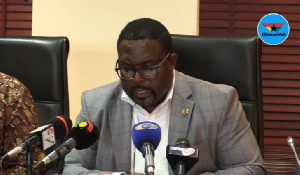The Commissioner of the Customs Division of GRA, Isaac Crentsil has disclosed that no importer will bear the cost of the Cargo Tracking Note policy to be implemented on the 15th October, 2018.
Contrary to media reports, he said the GRA will instead shoulder all the CTN charges.
“Ghana Revenue Authority is going to take all charges pertaining CTN. Nobody is going to pay anything on CTN. Nobody!” he emphasized.
Isaac Crentsil who was speaking at a stakeholder engagement to educate players in the shipping industry on the implementation of the CTN Policy, said the main objective of the CTN is to facilitate trade and improve compliance level.
“It is coming to facilitate trade and help us improve compliance. That is the essence of CTN.
We are not proposing CTN to punish anybody. But we are proposing CTN to serve as a compliance tool. We at the office sometimes come that, look we didn’t ask the shippers to put this in the container, we are not aware of this or there has been a short change. All these things will be addressed if we have the CTN in place,” he said.
Under the CTN Policy, shipping lines are to provide CTN numbers on all Bills of Lading. Shippers and Forwarders at the various ports of loading are to provide detailed and timely information on all shipments to Ghana in advance on the Global Online Platform made available for the purpose.
A consultant from CTN Company Limited, Joffrey Cole Nyarko took stakeholders through the CTN process flow which includes the shipper or exporter at the port of origin registering and creating an account online with CTN before proceeding to obtain a CTN number.
He said the CTN in addition to several benefits will give Customs and other state organizations a comprehensive view of the entire trade chain.
“CTN data base will remain a risk assessment engine for Customs. From where many activities including what is already being done on the ground can be compared. Because we have the pre and we have the post. With that information, GPHA has also a clear view of what is coming into the country. Dangerous cargo, whatever needs to be banned. We cannot mix dangerous cargo with perishable items or explosives or frozen items on the same terminal as you would expect,” he explained.
Business News of Thursday, 18 October 2018
Source: Patrick Paintsil

















